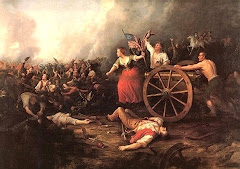Friday, October 17, 2008
Molly's Main Accomplishments
Molly Pitcher-Life Story
My name is Mary Ludwig Hays McCauley but I am more commonly known as "Molly Pitcher." This is how most refer to me. I was born on October 13, 1754 in Trenton, New Jersey. However I grew up in Carlisle Pennsylvania. I was the daughter to a New Jersey dairy farmer and I began working as a servant girl at the age of thirteen. I married as a young teen to a young barber named William Hays.
I wasn’t a regular house wife and did not stay at home while my husband was out. I followed him when he went to fight in the Revolutionary War and also to the battle of Monmouth on July 28, 1778. That day was extremely hot and the soldiers were falling down from the heat. To help out, I carried pitchers of water to the parched men and that is where I got my name Molly Pitcher. I also carried a wounded soldier on my back to move him out of reach of the British,
I also tended the wounded and sick and looked out for my husband all at the age of nineteen. The days became very hot reaching ninety eight degrees during the war. When William was overcome by the stifling heat, I took his place and manned the cannon. The cannon crew grew very tired and exhausted and were about to give up until I stepped in and acted as a gunner. Without my help to these men, the battle might have been lost. I was brave because I could have easily been killed, but I kept fighting and came out alive.
After watching my husband fall in battle, I took his rammer staff from his fallen hands. This was only my second time on an American battlefield and I was able to operate a gun. Due to my actions, General Washington himself issued me a warrant as a non-commissioned officer and I was later referred to as “Sergeant Molly.”
After William recovered, I continued with him in the army, nursing the sick and wounded and making my self generally useful, I was fearless. I enjoyed helping out the soliders and bringing water to them was the least I could do. Some of the soldiers died of heat stroke which broke my heart, but I never gave up even in my warm outfit. I almost got hit by the enemies cannon ball but it passed by me and just ripped my skirt. I woke up every night during the battle every few hours to make sure the enemy soldiers weren’t around.. I continued fighting even when the soldiers stopped, everything I did was for them. I encouraged them and gave them hope.
After the closing of the war, William and I returned to Pennslyvania and settled in Carlisle where I went back to work as a domestic as well as a charwoman in the State House. Shortly after our return in 1789, my husband William passed away and I later married John McCauley. I died when I was seventy eight years old in the year 1832. A flagstaff and a cannon rest at my gravesite in Pennyslavia where I grew up. My deeds to the country helped prove that men and women are equal and that women are capable of fighting too.


